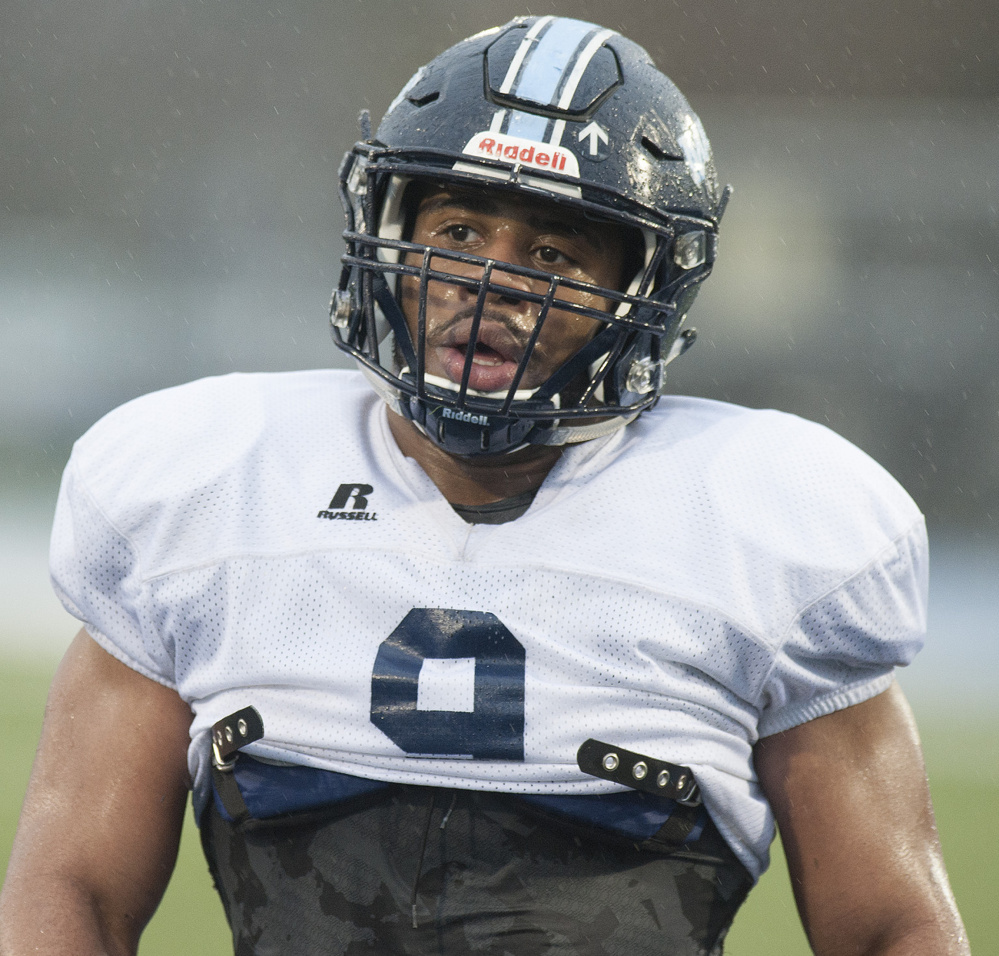ORONO — There is no jersey number more cherished on the University of Maine football team than No. 9.
Since defensive end Matt King first asked to wear it in 2002, it has come to signify the toughest player on defense, someone who can be counted on to make the big play, to be a leader.
By tradition, the uniform number has been passed down from a senior to an underclassman ever since.
Darius Greene wore the No. 9 jersey last year after it was willed to him by linebacker Trevor Bates, now with the New England Patriots. In December, Greene presented No. 9 to defensive end Uchenna Egwuonwu, a redshirt junior from Union, New Jersey. Egwuonwu was humbled because he knows what it means to pull that jersey over his shoulder pads.
“It means I have some big shoes to fill,” Egwuonwu said last week. “It means I have to step up and accept my role in this defense. I’m now seen as a leader, not just on defense but on the team as a whole, and I have to portray that image on and off the field. It means I have to be even more accountable.”
The 6-foot-2, 263-pound Egwuonwu made the switch from defensive tackle to defensive end after the third game last fall, and by the end of the season was one of Maine’s top defensive linemen. He finished with 40 tackles (eighth on the team), 3.5 tackles for a loss and one sack.
“He’s a very hard worker,” said Greene, who graduated last December with a communications degree. “He’s a guy who gives constant effort. I’ve seen him progress, seen him improve every year since he’s been here. I see him going far with his talent and dedication.”
His coaches are eager to see how Egwuonwu handles the responsibilities. They have confidence in his ability. They know what he’s done to get to this point, going from a 299.8-pound redshirt freshman defensive tackle to a defensive end strong enough to take on blockers and mobile enough to rush the quarterback.
“He’s completely changed,” said defensive coordinator Corey Hetherman. “We’ve leaned him out and he’s much stronger. He’s moving better, he’s more flexible and less injury-prone than when he got here.”
And by that, Hetherman doesn’t mean just as a player.
“He’s no longer a guy who was a role player or a backup,” said Hetherman. “Last year, he stepped into that starting role and he had some veterans to learn from. Now we need him to be a guy who’s ready to go every day we’re on the field. Every drill, every little thing we’re doing, he’s got to make sure he’s on top of it, because that’s the guy that the younger guys are going to look at.”
Joe Harasymiak, in his second year as head coach, stressed that, “with that jersey, and everything that comes with it, he really needs to step up. He has no choice.”
Harasymiak noted that Maine’s defense is going to be young. “I think Darius saw someone who can carry it for the next two years,” he said.
Egwuonwu, 20, is eager to prove he deserves this.
“I don’t go about life expecting to receive things,” he said. “I feel everything has got to be earned. I’m grateful, but I feel this is the time that you earn the number, not when you get it.
“There’s a lot more responsibility, I know, and it’s crazy to think that I’m an upperclassman now, that I’m like … a teacher. Well, the teacher can’t decide to take plays off. He has to always be on everything, to see everything, to help the other players along. That’s what I’m working to accomplish.”
Maine was the only school to offer Egwuonwu a scholarship. He received a call from Harasymiak, then an assistant to Jack Cosgrove, in January 2014. “Me and my mom had a little celebration in our home,” he said.
Egwuonwu and his mother, Ifeoma, had just returned from visiting family in Nigeria, where his mother and father, Emmanuel, were born. His parents run a medical lab in eastern Nigeria, near the villages they were raised in, and visit often. Egwuonwu said his father spends much of his time there now. His parents also are involved with Hope Alive Africa Charities, Inc. Their connection to Nigeria is what prompted Egwuonwu to major in construction engineering technology.
“Even though I wasn’t born there, I want to go back and give to those communities,” he said. “Maybe I could get into something that would create jobs in the local villages, instead of just farm work, which is what my parents grew up doing. Maybe I can get them into something else, like construction.
“I have to finish my degree, but I want to be like my parents and go back and forth, to help. That’s what I want to do.”
Send questions/comments to the editors.




Success. Please wait for the page to reload. If the page does not reload within 5 seconds, please refresh the page.
Enter your email and password to access comments.
Hi, to comment on stories you must . This profile is in addition to your subscription and website login.
Already have a commenting profile? .
Invalid username/password.
Please check your email to confirm and complete your registration.
Only subscribers are eligible to post comments. Please subscribe or login first for digital access. Here’s why.
Use the form below to reset your password. When you've submitted your account email, we will send an email with a reset code.